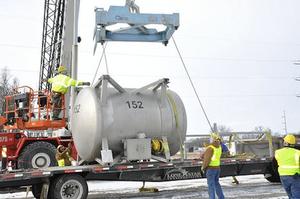Chemical weaponsEnd of Utah’s chemical weapons stockpile signals end of federal grants
As the last of Utah’s chemical weapons stockpile is destroyed, the millions of dollars that have flowed into the state from federal grants will begin to disappear along with thousands of jobs

The U.S. Army is destroying aging chemical weapons stockpiles, and with it, federal grant funding // Source: the9billion.com
As the last of Utah’s chemical weapons stockpile is destroyed, the millions of dollars that have flowed into the state from federal grants will begin to disappear along with thousands of jobs.
The United States is in the process of destroying its vast quantities of chemical weapons that were manufactured for war but never used. Most recently Tooele County’s Deseret Chemical Depot incinerated its last two-ton containers of Lewisite, a deadly blister agent.
The presence of such a lethal chemical agent in vast quantities spurred the Federal Emergency Management Agency and the U.S. Army to send Utah millions of dollars in federal grants to ensure that local and state authorities could effectively respond in the event of a chemical release.
Since 1989 Utah has received $124 million in federal funding through the Chemical Stockpile Emergency Preparedness Program.
“The federal government realized that if you are going to bring something so horrible to a community, you have to make sure your community is prepared to respond if something goes wrong,” said Joe Dougherty, a spokesman for Utah’s emergency management agency. “This is one of those areas where you see the federal government has done things exactly as they should have and met its obligations.”
Roughly $75 million of that money went to Tooele County to help construct a sophisticated emergency management facility replete with self-contained bunkers with enough water, air, and sewage capacity to last for up to ten days.
“This money has benefited Tooele County immensely over the past twenty-three years. It has provided many benefits beyond our Emergency Operations Center,” said Wade Mathews, a spokesman for the county’s emergency management agency. “Now, Tooele County’s readiness capability has been described as one of the best in the nation for its size, for being a rural county in the West.”
But with the last of the chemical weapons destroyed, the federal grant money will soon stop flowing into the county.
“Tooele County is going to see that federal funding come to an abrupt end very soon,” Matthews said. “It means our budget will be greatly reduced, but our department will remain. We have had to downsize two of our employees”
In addition roughly 1,400 jobs will disappear. Many of those jobs will likely be transferred to Kentucky or Colorado, which have yet to begin destroying their weapons stockpiles.
According to Alaine Grieser, a spokeswoman for the Tooele County Chemical Depot, the facility will not be fully shut down until 2014, but by then only a few employees will remain.
